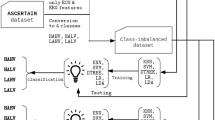Abstract
Brain functions can be analysed by recording electrical activity, which can be done through methods such as electroencephalography (EEG). In the present study, we focused on the identification of three emotional states using EEG signals: happiness, sadness and anger. We used data from a study published on OpenNeuro [1] and analysed it in order to decode emotional states from EEG signals. We first processed the data into their distinct frequency bands and computed the power spectral density, before extracting the spectral power of five frequency bands from the signal. Subsequently, we used a support vector machine (SVM) algorithm to classify the signals based on their corresponding emotional states. After including all frequency bands as features to train the SVM algorithm, we used 5-fold cross validation to determine the accuracy of our model which was 73.99% and significantly higher than chance-level accuracy of 33.33%. After comparing different frequency band combinations as features, using the delta, gamma, beta and theta frequency bands resulted in the highest accuracy, of 74.25%, for our SVM algorithm in classifying the emotional states of happiness, sadness and anger. We concluded that using all frequency bands as features does not necessarily result in the highest possible accuracy rate as some frequency bands lower the accuracy of the machine learning classifier.
Access this chapter
Tax calculation will be finalised at checkout
Purchases are for personal use only
Similar content being viewed by others
References
OpenNeuro Study: https://openneuro.org/datasets/ds003004/versions/1.1.1. Last accessed 29 Dec 2022
Littrell, J.: The mind-body connection. Soc. Work Health Care 46(4), 17–37 (2008)
Levine, G.N., Cohen, B.E., Commodore-Mensah, Y., Fleury, J., Huffman, J.C., Khalid, U., Labarthe, D.R., Lavretsky, H., Michos, E.D., Spatz, E.S., Kubzansky, L.D.: Psychological health, well-being, and the mind-heart-body connection: a scientific statement from the American Heart Association. Circulation 143(10) (2021)
Thomas, D.L.: How do your emotions affect your physical health? News (2022)
Davidson, K.W., Mostofsky, E., Whang, W.: Don’t worry, be happy: positive affect and reduced 10-year incident coronary heart disease: the Canadian Nova Scotia Health Survey. Eur. Heart J. 31(9), 1065–1070 (2010)
Barrett, L.F.: Facial expressions do not reveal emotions. Sci. Am. (2022)
Houssein, E.H., Hammad, A., Ali, A.A.: Human emotion recognition from EEG-based brain-computer interface using machine learning: a comprehensive review. Neural Comput. Appl. 34(15), 12527–12557 (2022)
Al-Qazzaz, N.K., Sabir, M.K., Ali, S.H.B.M., Ahmad, S.A., Grammer, K.: Electroencephalogram profiles for emotion identification over the brain regions using spectral, entropy and temporal biomarkers. Sens. (Basel, Switzerland) 20(1), 59 (2019)
Lew, W.C.L., Wang, D., Ang, K.K., Lim, J.H., Quek, C., Tan, A.H.: EEG-video emotion-based summarization: Learning with EEG auxiliary signals. IEEE Trans. Affect. Comput. 13(4), 1827–1839 (2022)
Khosrowabadi, R., Chai, Q., Ang, K.K., Wahab, A.: ERNN: a biologically inspired feed-forward neural network to discriminate emotion from EEG signal. IEEE Trans. Neural Netw. Learn. Syst. 25(3), 609–620 (2014)
Nayak, C.S., Anilkumar, A.C.: EEG normal waveforms—statpearls—NCBI bookshelf. National Library of Medicine (2022)
Liu, H., Zhang, Y., Li, Y., Kong, X.: Review on emotion recognition based on electroencephalography. Front. Comput. Neurosci. 15 (2021)
Roy, K., Kar, S., Das, R.N.: Selected statistical methods in QSAR. Understand. Basics QSAR Appl. Pharm. Sci. Risk Assess. 191–229 (2015)
Antony, M.J., Sankaralingam, B.P., Mahendran, R.K., Gardezi, A.A., Shafiq, M., Choi, J.-G., Hamam, H.: Classification of EEG using adaptive SVM classifier with CSP and online recursive independent component analysis (2022)
Donges, N., Urwin, M., Pierre, S.: Random Forest: a complete guide for machine learning. Built In (2023)
Awati, R.: What are convolutional neural networks? Definition from TechTarget. Enterprise AI (2023)
Miller, J., Ulrich, R.: The quest for an optimal alpha. PLOS ONE (2019)
Author information
Authors and Affiliations
Corresponding authors
Editor information
Editors and Affiliations
Rights and permissions
Copyright information
© 2023 The Author(s), under exclusive license to Springer Nature Singapore Pte Ltd.
About this paper
Cite this paper
Surendrakumar, S.R., Xuan, A.P.G., Brian, P. (2023). Determination of Emotional States from Electroencephalogram (EEG) Data Using Machine Learning. In: Lu, J., et al. Proceedings of the 9th IRC Conference on Science, Engineering, and Technology. IRC-SET 2023. Springer, Singapore. https://doi.org/10.1007/978-981-99-8369-8_26
Download citation
DOI: https://doi.org/10.1007/978-981-99-8369-8_26
Published:
Publisher Name: Springer, Singapore
Print ISBN: 978-981-99-8368-1
Online ISBN: 978-981-99-8369-8
eBook Packages: Physics and AstronomyPhysics and Astronomy (R0)




